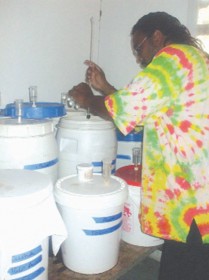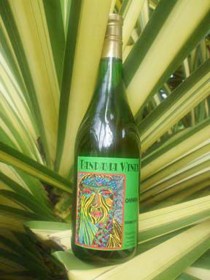If Warren Douglas gets his way Guyana could be exporting a range of high-quality, fruit-based table wines to the rest of the Caribbean in less than a year. Warren’s Pandama brand of wines has already won a measure of acclaim among a modest but appreciative cross-section of local wine drinkers. The quality of his offering no less than his attractive labelling and presentation has attracted the patronage of some of the city’s more popular supermarkets including Nigel’s, Survival, Guyana Stores, Fogarty’s, N&S Mattai and the Police Consumers Co-op Society. In the short-term, his local marketing plans include targeting hotels and restaurants, both directly and through the Tourism and Hospitality Association of Guyana (THAG).

Guyana, however, is only a small part of Warren’s plan for his Pandama brand. Brimming with confidence in its potential to become a favoured local export, the remigrant-turned-vintner has given himself six months to break into the regional market. Trinidad and Tobago, Barbados, Grenada, St. Lucia and St. Vincent are his immediate regional target markets and market acceptance in those territories will see him tackle what he considers to be a more challenging Jamaican market.
There is much about this modest manufacturing initiative that is deserving of commendation. Warren and his American-born wife Tracy returned to Guyana and established their home on a seventeen-acre plot of land at Madewini on the Soesdyke-Linden Highway between the Marudi Creek and Splashmin’s. Home is also the factory where 5,000 gallons of wine are produced every month. The operation, comprising an assemblage of primary and secondary fermenters, bottle filters, siphons, sanitizers and fruit presses was established on a US$10,000 investment and is powered by solar energy. The Douglases do their own bottling, labelling and packing into cartons.
The name Pandama is borrowed from a palm that is common to the area where the couple has made their home which is named the Pandama Retreat. The label on the wine bottle, a meditative drawing, is the work of Tracy, a talented creative artist who, just recently, was elected President of the Guyana Art and Craft Producers Association.
No less significant is the fact that the fruit base of the Pandama wines is local – plum, cashew, jamoon, aunty desmond, carambola, orange, pineapple, cherry and gooseberry. It is, unquestionably, his success in applying local fruit to the manufacture of high-quality wine that is Warren’s proudest achievement. Nor is he daunted by the challenge of the seasonal nature of some of the fruits used by the Pandama winery. His plans include developing the technology to acquire and preserve seasonal fruits at times when they are in season.

Targeting a regional market requires a significant expansion of existing operations. Moving to the next level requires an estimated US$25,000 investment which will be used to increase fermenting, filtering and bottling capacity. Over the next year Warren aims to increase production to 50,000 gallons.
If the Pandama brand is already being touted as the leading table wine in Guyana, Warren, who learnt his trade in Charlotte, North Carolina, still considers himself a novice at the business. That is why he is currently working with the Canadian Executive Services Overseas (CESO) to secure the services of an expert who will spend two weeks supporting the improvement of the brand. Wine-making, Warren says, is a complex and highly technical profession and he is looking forward to receiving expert coaching.
At last week’s Main Street exhibition and sale hosted by the Guyana Association of Art and Craft Producers, Pandama wines was one of the new and attractive products on show. Warren says that he was satisfied with the patronage and particularly with the opportunity which the event afforded to introduce the product to a wide cross-section of Guyanese. His research into the local and regional wine market has pointed to an absence of any identifiable Caribbean monopoly on table wines. “Most of our table wines are imported from outside the region,”
The new Culinary Arts Section of the Guyana Art and Craft Producers Association plans to host a food and beverage event later this year and Warren says that he will be seeking to use that opportunity to further promote his product locally. He and Tracy are also currently planning their participation in this year’s GuyExpo where they anticipate a greater measure of both local and overseas interest in Pandama wines. Warren says that Pandama has already embarked on a modest diversification initiative which has seen the production of a range of tonic wines, manufactured from the same local fruit base.
The tonic wines, he says, are fashionable with health-conscious Guyanese and he hopes to secure significant markets for the product both locally and elsewhere in the Caribbean.





